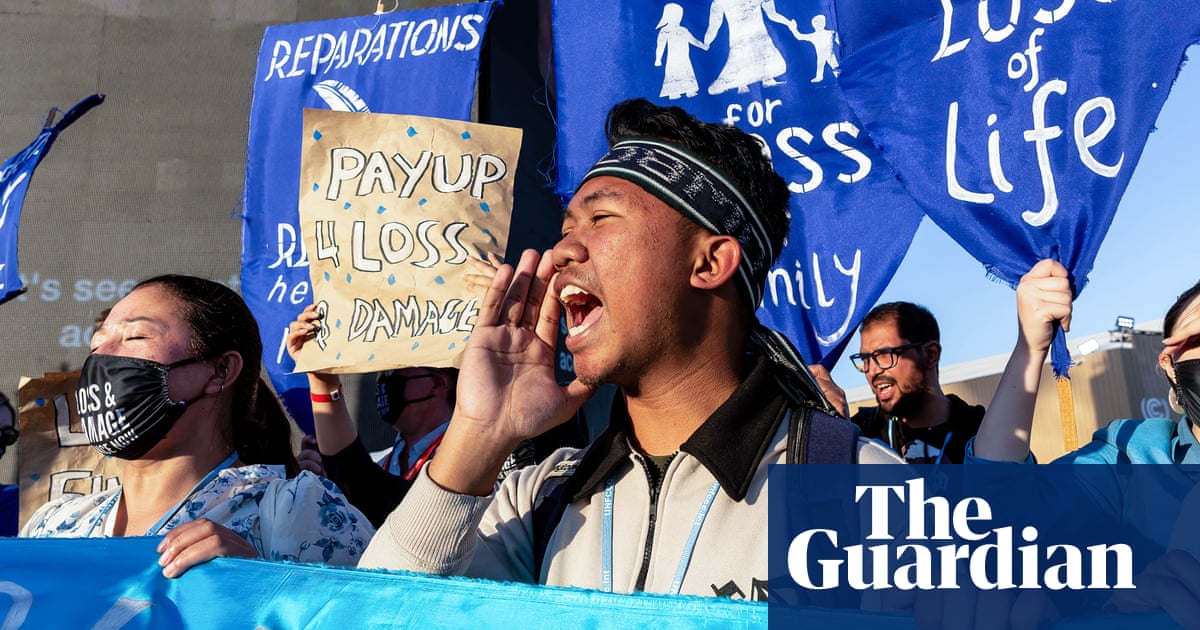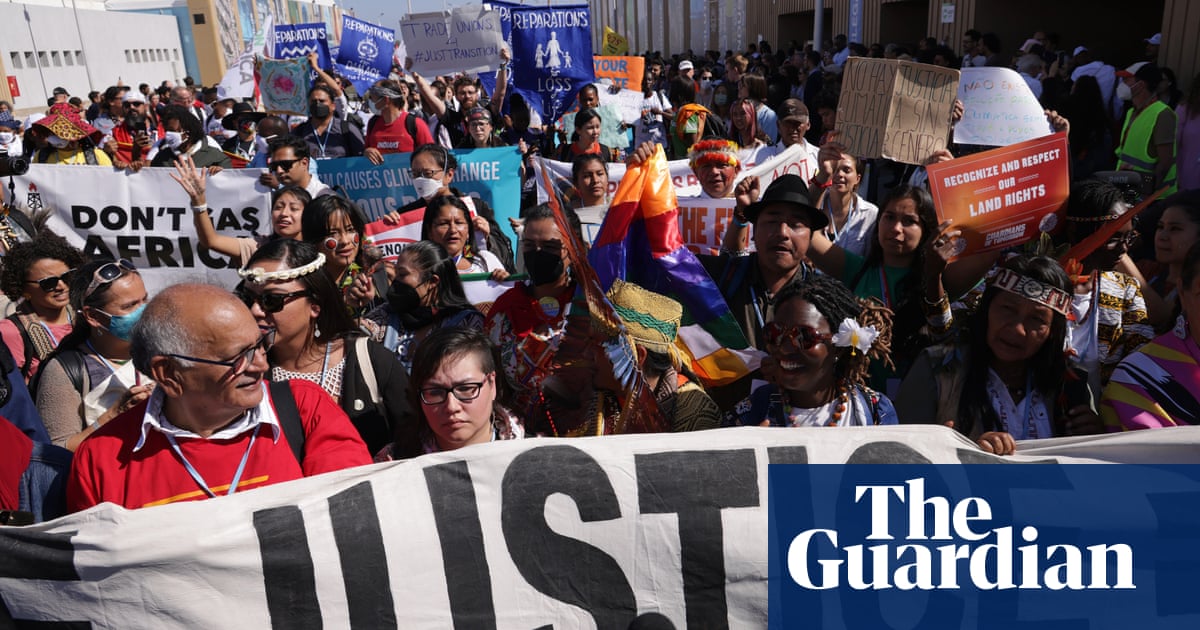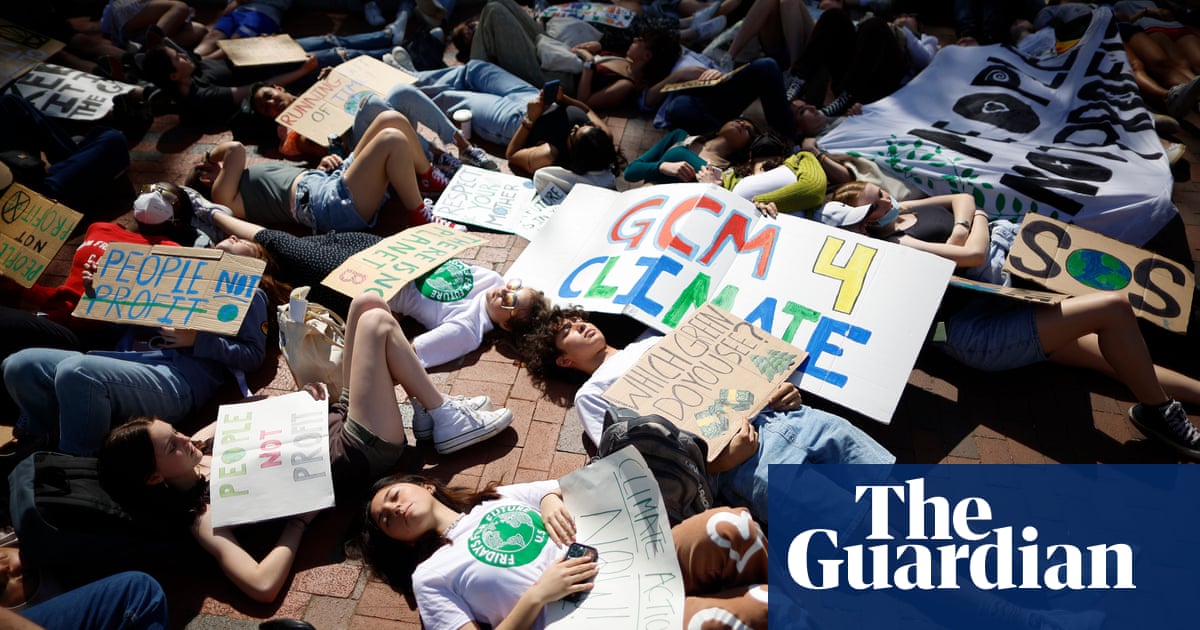Welcome to Tesla Motors Club
Discuss Tesla's Model S, Model 3, Model X, Model Y, Cybertruck, Roadster and More.
Register
Install the app
How to install the app on iOS
You can install our site as a web app on your iOS device by utilizing the Add to Home Screen feature in Safari. Please see this thread for more details on this.
Note: This feature may not be available in some browsers.
-
Want to remove ads? Register an account and login to see fewer ads, and become a Supporting Member to remove almost all ads.
You are using an out of date browser. It may not display this or other websites correctly.
You should upgrade or use an alternative browser.
You should upgrade or use an alternative browser.
Climate Change / Global Warming Discussion
- Thread starter Raffy.Roma
- Start date
-
- Tags
- Energy Environment Policy
mspohr
Well-Known Member
Vox.com: Do we need degrowth? Can we save the climate while growing the economy?.
https://www.vox.com/future-perfect/23447414/degrowth-decoupling-carbon-emissions-economic-growth
The evidence comes from more than 30 countries that have already achieved what’s known as “absolute decoupling.” That means they’ve figured out how to reduce carbon emissions while continuing to grow economically, so those goals are not incompatible. Note that these are not just per capita measures; we’re talking about total emissions and total economies here.
https://www.vox.com/future-perfect/23447414/degrowth-decoupling-carbon-emissions-economic-growth
The evidence comes from more than 30 countries that have already achieved what’s known as “absolute decoupling.” That means they’ve figured out how to reduce carbon emissions while continuing to grow economically, so those goals are not incompatible. Note that these are not just per capita measures; we’re talking about total emissions and total economies here.
mspohr
Well-Known Member

A just transition depends on energy systems that work for everyone
Climate justice activists at Cop27 demand community-based renewable projects that work for the people, not corporations
This short-term fix to the energy price crisis created by Russia’s war on Ukraine will lock some of the poorest, most climate-affected countries in the world in polluting fossil fuel projects with few economic or energy benefits for the communities whose land, water and heritage will be sacrificed.
It has been called out as “energy colonialism” – a political-corporate alliance on display at Cop27. There, more than 630 industry lobbyists are scattered around the conference centre in Sharm el-Sheikh as deals on climate finance, forests and food systems are being made.
But the climate justice movement’s message is clear: community-based renewable projects that work for the people, not corporations, are a necessity, according to Dipti Bhatnagar, from Friends of the Earth International in Mozambique. “It’s not just about the energy source, it’s about the whole energy system – who decides, who benefits and who profits.”
mspohr
Well-Known Member

Impose climate tax on fossil fuel giants, media groups urge
The Guardian and dozens of international media titles publish a joint editorial calling for radical thinking on how to fund climate action in poorer countries
Dozens of media organisations from around the world have published a joint editorial article calling for a windfall tax on the biggest fossil fuel companies.
The funds raised should be redistributed to poorer, vulnerable countries, the editorial says, as they are suffering the worst impacts of the climate crisis despite having done the least to cause it.
“Humanity has to end its addiction to fossil fuels,” the joint editorial, which was coordinated by the Guardian, says. “Rich countries account for just one in eight people in the world today but are responsible for half of greenhouse gases. These nations have a clear moral responsibility to help.”
mspohr
Well-Known Member

Climate-focused reform of World Bank could be done in a year, says Al Gore
Former US vice-president says bank should refocus its spending and end its role in ‘fossil fuel colonialism’
Fundamental reform of the World Bank could be completed within a year, to refocus its spending on the climate crisis and end its contribution to “fossil fuel colonialism”, according to the former US vice-president Al Gore.
Fundamental reform of the World Bank could be completed within a year, to refocus its spending on the climate crisis and end its contribution to “fossil fuel colonialism”, according to the former US vice-president Al Gore.
In Gore’s view, Malpass “has been a climate denier for quite a long time. He ran for Congress as a climate denier. He’s made multiple statements over the years making it clear that he just has serious doubts that the climate crisis is real.”
Gore added: “There has been no vision in the World Bank system. And when you have a climate denier in charge of it, what they see is not the energy transition, they see their friends in the fossil fuel companies and the banks, that are also connected with the fossil fuel companies.”
mspohr
Well-Known Member
California latest lame plan

 calmatters.org
calmatters.org

Slashing greenhouse gases: California revises climate change strategy
The new version of California’s climate plan sets a more stringent — some say unrealistic — target for cutting greenhouse gases.
mspohr
Well-Known Member

US shamed as the ‘colossal fossil’ of Cop27 climate summit by campaigners
Climate action group believes US is blocking progress on global heating by rejecting payments to poorer countries
The US took this year’s unwanted title for so far failing to back the creation of a new “loss and damage” fund, tentatively backed by the European Union, that would provide money to poorer countries suffering severe climate impacts.
John Kerry, the US climate envoy, has said the US is open to discussing the idea over the next two years, although it is wary of opening itself up to any sort of liability for the damages its huge historical emissions have caused.
mspohr
Well-Known Member

Voters pass historic climate initiatives in ‘silent surprise’ of US midterms
The electoral support at the state and local levels for more climate action comes as world leaders meet at Cop27
While the economy and abortion rights drove momentum behind the midterm election this year, voters in cities and states across the US also turned out to pass a number of climate ballot initiatives .
mspohr
Well-Known Member

How a 'Carbon Cage' Blocks Climate Mitigation
Our current carbon-heavy economic system creates bars around us that stop effective climate change action.
This brings us to the carbon cage: all of us are stuck in a fossil-fueled economic system, its significant levels of production, its need for commensurate levels of consumption, and a powerful constituency of vested interests that seeks to maintain the status quo, with the fossil fuel industry the most prominent amongst them. This has led to overlapping ecological crises on a planetary scale. Yet who suffers most depends on factors such as class, race, gender, history and geography. Geography is critical; the status quo benefits the Global North disproportionately, with its long history of carbon-intensive growth and development that often relied on the colonial domination and exploitation of peoples and nations predominantly in the Global South.
However, like any set of bars, those in the carbon cage, while strong, need not be permanent. The work being done globally on a just transition, aiming to replace an economy built on extraction, waste and injustice with one that regenerates communities and the planet for collective well-being, can weaken the cage. This work includes energy democracy, with community and publicly owned renewables that ensure that essential services respond to need over profit; and local agroecological food systems that build biodiversity and resilience while feeding communities
dhanson865
Well-Known Member
Sea Level Rise and Coastal Flooding Impacts
Sea Level Rise Viewer: View projected sea level rise at any coastal location up to 6 feet of inundation from flooding, hurricane storm surge, high tides.
In another thread there was a discussion of Tesla making a new Gigafactory in Florida. I asked:
How many years until a FL factory has to be relocated? How many times would production be halted for Hurricanes/Flooding?
Why not build in East TN, East KY, or Southern Ohio where you aren't exposed to coastal issues?
and of course a mod deleted that post. No explanation given.
Is it really that outlandish to consider Sea Level Rise when building a new multibillion dollar factory? Or is it just a mod that wants to stick their head in the sand?
a historical record of Catagory 3,4,5 Hurricanes in florida, since around 1850
There was a humongous one in 1841 not here, there was a place called Fort Delany/Dulaney built 1839, right where the Sanibel Causeway now is (the one that got breached in 3-4 places by hurricane Ian, also not on this map that essentially "scraped it clean" with a maybe 14ft storm surge. a stepcousin had a car washed away while trying to escape the Florida Keys in the 1935 one, but he lived, unlike others.
 coast.noaa.gov
coast.noaa.gov

There was a humongous one in 1841 not here, there was a place called Fort Delany/Dulaney built 1839, right where the Sanibel Causeway now is (the one that got breached in 3-4 places by hurricane Ian, also not on this map that essentially "scraped it clean" with a maybe 14ft storm surge. a stepcousin had a car washed away while trying to escape the Florida Keys in the 1935 one, but he lived, unlike others.
Historical Hurricane Tracks
NOAA Hurricane Tracks, NOAA Historical Hurricane Tracks, hurricane paths, hurricane history, hurricane database
mspohr
Well-Known Member
We'll pay for damage out of our obscene fossil profits
World still ‘on brink of climate catastrophe’ after Cop27 deal
Oil-producing countries had thwarted attempts to strengthen the deal, said Laurence Tubiana, one of the architects of the 2015 Paris climate agreement, now chief executive of the European Climate Foundation. “The influence of the fossil fuel industry was found across the board,” she said. “This Cop has weakened requirements around countries making new and more ambitious commitments [on cutting emissions]. The text [of the deal] makes no mention of phasing out fossil fuels, and scant reference to the 1.5C target.”
World still ‘on brink of climate catastrophe’ after Cop27 deal
Oil-producing countries had thwarted attempts to strengthen the deal, said Laurence Tubiana, one of the architects of the 2015 Paris climate agreement, now chief executive of the European Climate Foundation. “The influence of the fossil fuel industry was found across the board,” she said. “This Cop has weakened requirements around countries making new and more ambitious commitments [on cutting emissions]. The text [of the deal] makes no mention of phasing out fossil fuels, and scant reference to the 1.5C target.”
mspohr
Well-Known Member
The big takeaway from Cop27? These climate conferences just aren’t working | Bill McGuire
It really does beggar belief, that in the course of 27 Cops, there has never been a formal agreement to reduce the world’s fossil fuel use. Not only has the elephant been in the room all this time, but over the last quarter of a century it has taken on gargantuan proportions – and still its presence goes unheeded. It is no surprise, then, that from Cop1 in Berlin in 1995, to Egypt this year, emissions have continued – barring a small downward blip at the height of the pandemic – to head remorselessly upwards.
Expectations were never especially high over the course of the 12 months since Glasgow’s Cop26. Even so, COP27 has to be a new low – held in a country cowed by a malicious dictatorship, the world’s biggest plastic polluter on board as a sponsor, and hosting more than 600 fossil fuel representatives and many others who are there to prevent, rather than promote progress and action. Some old hands have labelled it the worst COP ever, and I doubt many would argue.
What is needed is an apparatus that is less cumbersome and more manageable – something leaner and meaner that zeros in on the most critical aspects of the climate crisis, that does its work largely hidden from the glare of the media, and which presents a less obvious honey pot to the busy bees of the fossil fuel sector. One way forward, then, could be to establish a number of smaller bodies, each addressing one of the key issues – notably energy, agriculture, deforestation, transport, loss and damage, and perhaps others.
It really does beggar belief, that in the course of 27 Cops, there has never been a formal agreement to reduce the world’s fossil fuel use. Not only has the elephant been in the room all this time, but over the last quarter of a century it has taken on gargantuan proportions – and still its presence goes unheeded. It is no surprise, then, that from Cop1 in Berlin in 1995, to Egypt this year, emissions have continued – barring a small downward blip at the height of the pandemic – to head remorselessly upwards.
Expectations were never especially high over the course of the 12 months since Glasgow’s Cop26. Even so, COP27 has to be a new low – held in a country cowed by a malicious dictatorship, the world’s biggest plastic polluter on board as a sponsor, and hosting more than 600 fossil fuel representatives and many others who are there to prevent, rather than promote progress and action. Some old hands have labelled it the worst COP ever, and I doubt many would argue.
What is needed is an apparatus that is less cumbersome and more manageable – something leaner and meaner that zeros in on the most critical aspects of the climate crisis, that does its work largely hidden from the glare of the media, and which presents a less obvious honey pot to the busy bees of the fossil fuel sector. One way forward, then, could be to establish a number of smaller bodies, each addressing one of the key issues – notably energy, agriculture, deforestation, transport, loss and damage, and perhaps others.
mspohr
Well-Known Member
Could hemp be a key tool in fight against climate change?
In all the debates on how to curb climate change, hemp is hardly mentioned. Better known as cannabis, modern varieties of hemp are too weak to use as narcotics, but they are extremely efficient at absorbing and locking up carbon. Hemp is one of the fastest-growing plants in the world and can grow 4 metres high in 100 days. Research suggests hemp is twice as effective as trees at absorbing and locking up carbon, with 1 hectare (2.5 acres) of hemp reckoned to absorb 8 to 22 tonnes of CO2 a year, more than any woodland. The CO2 is also permanently fixed in the hemp fibres, which can go on to be used for many commodities including textiles, medicines, insulation for buildings and concrete; BMW is even using it to replace plastics in various car parts.
In all the debates on how to curb climate change, hemp is hardly mentioned. Better known as cannabis, modern varieties of hemp are too weak to use as narcotics, but they are extremely efficient at absorbing and locking up carbon. Hemp is one of the fastest-growing plants in the world and can grow 4 metres high in 100 days. Research suggests hemp is twice as effective as trees at absorbing and locking up carbon, with 1 hectare (2.5 acres) of hemp reckoned to absorb 8 to 22 tonnes of CO2 a year, more than any woodland. The CO2 is also permanently fixed in the hemp fibres, which can go on to be used for many commodities including textiles, medicines, insulation for buildings and concrete; BMW is even using it to replace plastics in various car parts.
Hemp and bamboo. Two very sustainable crops.Could hemp be a key tool in fight against climate change?
In all the debates on how to curb climate change, hemp is hardly mentioned. Better known as cannabis, modern varieties of hemp are too weak to use as narcotics, but they are extremely efficient at absorbing and locking up carbon. Hemp is one of the fastest-growing plants in the world and can grow 4 metres high in 100 days. Research suggests hemp is twice as effective as trees at absorbing and locking up carbon, with 1 hectare (2.5 acres) of hemp reckoned to absorb 8 to 22 tonnes of CO2 a year, more than any woodland. The CO2 is also permanently fixed in the hemp fibres, which can go on to be used for many commodities including textiles, medicines, insulation for buildings and concrete; BMW is even using it to replace plastics in various car parts.
mspohr
Well-Known Member
Best form of carbon capture.Hemp and bamboo. Two very sustainable crops.
mspohr
Well-Known Member
Humans v nature: our long and destructive journey to the age of extinction
Prof Mark Maslin, from University College London (UCL), suggests that the unsustainable hunting of megafauna may have been one of the driving forces that led humans to domesticate plants and animals. People started farming in at least 14 different places, independently of each other, from about 10,500 years ago. “Weirdly enough, I think the first biodiversity crisis was at the end of the last ice age, when early humans had slaughtered the megafauna and therefore they’d sort of run out of food, and that precipitated, in many places, a switch to agriculture,” he says.
For a long time, these extinctions were thought to be linked to natural changes in the environment – until 1966, when palaeontologist Paul S Martin put forward his controversial “overkill hypothesis” that humans were responsible for the extinctions of megafauna, destroying the romantic vision of early humans living in harmony with nature.
Prof Mark Maslin, from University College London (UCL), suggests that the unsustainable hunting of megafauna may have been one of the driving forces that led humans to domesticate plants and animals. People started farming in at least 14 different places, independently of each other, from about 10,500 years ago. “Weirdly enough, I think the first biodiversity crisis was at the end of the last ice age, when early humans had slaughtered the megafauna and therefore they’d sort of run out of food, and that precipitated, in many places, a switch to agriculture,” he says.
For a long time, these extinctions were thought to be linked to natural changes in the environment – until 1966, when palaeontologist Paul S Martin put forward his controversial “overkill hypothesis” that humans were responsible for the extinctions of megafauna, destroying the romantic vision of early humans living in harmony with nature.
mspohr
Well-Known Member
‘They teach us’: how whales can help dispel the myth of green capitalism
The Value of a Whale argues that their version of decarbonisation preserves existing inequalities while creating new opportunities for profit – neither a viable response to the crisis we’ve created, nor a fair one. She cites three examples. First, carbon offsetting, which is often predicated on the seizure of the global south – just one way in which the freedom to consume affordable goods in the rich world is increasingly based on the unfreedom of people across the world. Second, environmentally conscious investing, which is based on definitions of sustainability that are almost entirely unregulated. And third, asset manager capitalism, under which huge investment companies shape government climate policy so that among the multitude of options available the one that’s attractive to them is privileged. “Think 1:1 replacement of cars with electric vehicles, in lieu of investment in mass transit,” she tells me. “Not all climate policy”, Buller says, “is good climate policy
So much of the global economy is structured around fossil fuels that for carbon pricing to be successful, the price would either have to be “so high that it would be economically devastating”, Buller argues, “particularly to the poor and it’s untenable for that reason. Or it would have to be gentle enough to get buy-in and not cause real economic harm, particularly for the poorest. And in that case, it’s unlikely to really have an impact.” These are not simply knots that we can loosen as we go. “Evidence suggests it isn’t working now at anything like the required pace or scale,” she says, “and there’s little reason to think it will in some imagined future”. She later sends me a link to recent academic studies that, she says, prove her point.
The Value of a Whale argues that their version of decarbonisation preserves existing inequalities while creating new opportunities for profit – neither a viable response to the crisis we’ve created, nor a fair one. She cites three examples. First, carbon offsetting, which is often predicated on the seizure of the global south – just one way in which the freedom to consume affordable goods in the rich world is increasingly based on the unfreedom of people across the world. Second, environmentally conscious investing, which is based on definitions of sustainability that are almost entirely unregulated. And third, asset manager capitalism, under which huge investment companies shape government climate policy so that among the multitude of options available the one that’s attractive to them is privileged. “Think 1:1 replacement of cars with electric vehicles, in lieu of investment in mass transit,” she tells me. “Not all climate policy”, Buller says, “is good climate policy
So much of the global economy is structured around fossil fuels that for carbon pricing to be successful, the price would either have to be “so high that it would be economically devastating”, Buller argues, “particularly to the poor and it’s untenable for that reason. Or it would have to be gentle enough to get buy-in and not cause real economic harm, particularly for the poorest. And in that case, it’s unlikely to really have an impact.” These are not simply knots that we can loosen as we go. “Evidence suggests it isn’t working now at anything like the required pace or scale,” she says, “and there’s little reason to think it will in some imagined future”. She later sends me a link to recent academic studies that, she says, prove her point.
mspohr
Well-Known Member
From the Amazon to Australia, why is your money funding Earth’s destruction? | George Monbiot
The world’s most destructive industries are fiercely protected by governments. The three sectors that appear to be most responsible for the collapse of ecosystems and erasure of wildlife are fossil fuels, fisheries and farming. In 2021, governments directly subsidised oil and gas production to the tune of $64bn (£53bn), and spent a further $531bn (£443bn) on keeping fossil fuel prices low. The latest figures for fisheries, from 2018, suggest that global subsidies for the sector amount to $35bn a year, over 80% of which go to large-scale industrial fishing. Most are paid to “enhance capacity”: in other words to help the industry, as marine ecosystems collapse, catch more fish. Every year, governments spend $500bn on farm subsidies, the great majority of which pay no regard to environmental protection. Even the payments that claim to do so often inflict more harm than good. For example, many of the European Union’s pillar two “green” subsidies sustain livestock farming on land that would be better used for ecological restoration. Over half the European farm budget is spent on propping up animal farming, which is arguably the world’s most ecologically destructive industry.
The world’s most destructive industries are fiercely protected by governments. The three sectors that appear to be most responsible for the collapse of ecosystems and erasure of wildlife are fossil fuels, fisheries and farming. In 2021, governments directly subsidised oil and gas production to the tune of $64bn (£53bn), and spent a further $531bn (£443bn) on keeping fossil fuel prices low. The latest figures for fisheries, from 2018, suggest that global subsidies for the sector amount to $35bn a year, over 80% of which go to large-scale industrial fishing. Most are paid to “enhance capacity”: in other words to help the industry, as marine ecosystems collapse, catch more fish. Every year, governments spend $500bn on farm subsidies, the great majority of which pay no regard to environmental protection. Even the payments that claim to do so often inflict more harm than good. For example, many of the European Union’s pillar two “green” subsidies sustain livestock farming on land that would be better used for ecological restoration. Over half the European farm budget is spent on propping up animal farming, which is arguably the world’s most ecologically destructive industry.
Similar threads
- Replies
- 19
- Views
- 1K
- Replies
- 48
- Views
- 4K
- Replies
- 64
- Views
- 4K
- Replies
- 52
- Views
- 33K
- Replies
- 4
- Views
- 12K


